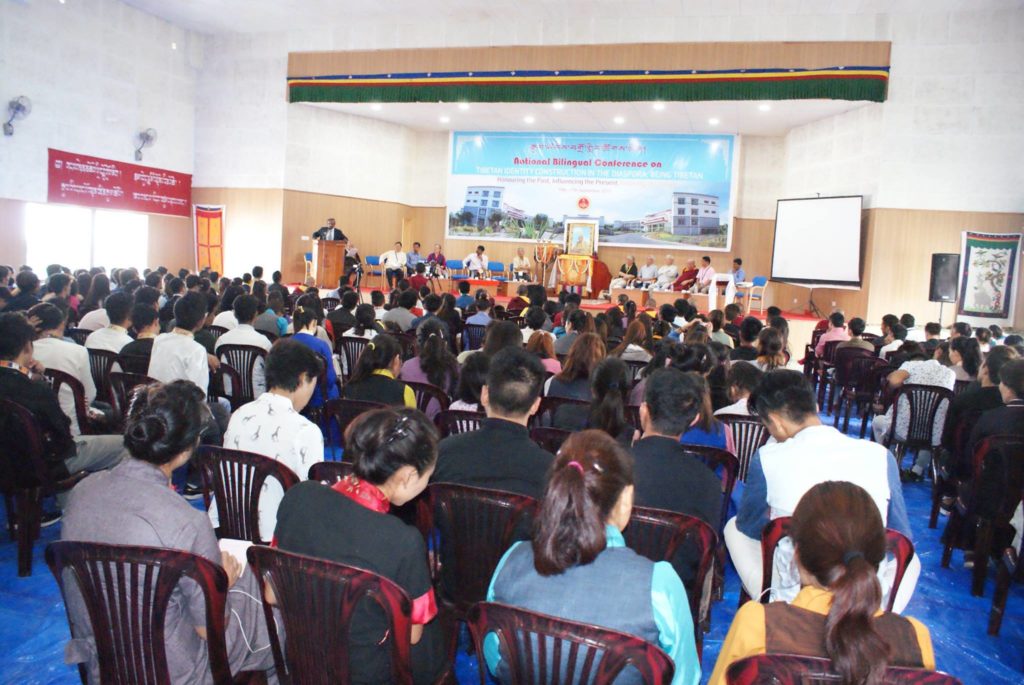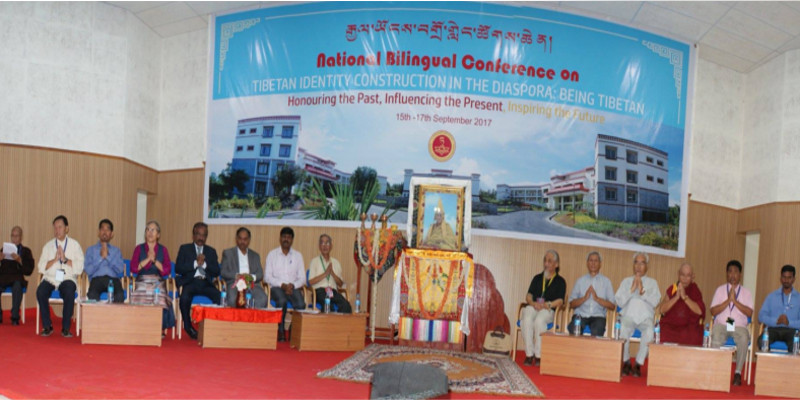Bengaluru, 15th September: The Dalai Lama Institute for Higher Education is currently holding its first national conference on Tibetan Identity Construction in the Diaspora: Being Tibetan. The inaugural ceremony of the conference began today at 9 am with arrival of the Chief Guest, Prof. H.N Ramesh, Vice Chancellor, Bengaluru University. Guests of honor, Mr. Thupten Samphel, Director, Tibet Policy Institute and Dr. B.K. Ravi, Registrar and Professor, Department of Journalism and Mass Communication, Bengaluru University also graced the event.
Dr. B. Tsering, Principal, Dalai Lama Institute of Higher Studies delivered the welcome address to the guests and participants of the conference and also, traced the background of the institute. “What is it that makes one a Tibetan? How do we sustain, enrich and energize it across boundaries and generations? Every single one of you can contribute to this discussion and I hope you will,” added Dr. B Tsering.
Prof. H.N. Ramesh began his keynote address by proclaiming that DLIHE is now to be officially affiliated with Bengaluru University. Professor admitted, “As Indians, we also want a strong Tibet. As you know, we all play a part in reconstruction of Tibet. We, Indians are with his holiness The Dalai Lama at any point of time and there’s no compromise as far as strengthening Tibet is concerned.”

Thupten Samphel, Director of Tibet Policy Institute during his address reflected on the exodus of Tibetans to exile and stated how the success of achieving a cohesive community from these scattered Tibetan refugees is considered one of the miracles of the 20th Century by scholars. He also acknowledged, “Under the guidance of his holiness, we have managed to create a Tibet outside of Tibet. This accomplishment is also due to the support and active assistance of Indian government. I would like to express my gratitude to the Government of India, especially to the government and people of Karnataka.”
Dr. B.K Ravi emphasized on the significance of Tibetan language in preserving Tibetan culture and identity by juxtaposing it with Kannada as a regional language and as the essence of Kannada culture. He added, “The Tibetan language is magnificent, powerful and interesting in its own right. The knowledge of Tibetan language contributes significantly in learning one’s Dharma studies and practice. In fact, to study Tibetan to practice the soul of Buddhism.”
Thupten Samphel presented on “The art of non-violence: Winning China over to Tibet’s Story” as he traced the major historic events including Tiananman Square Massacre, 1989’s martial law in Lhasa, 2008’s Beijing Olympic protest, etc that transpired over the years in the course of Tibetan movement. He emphasized on harnessing the power of narrative for Tibetans in reaching out for international support for the cause.
Dawa Dolma, Researcher and graduate of Masters in Political Science, Central University, Budapest, Hungary was the first presenter of the day. Her research paper is titled, “Survival and Revival of Tibetan Identity in Exile” which probes into the various factors that contributes to the construction and reconstruction of the Tibetan identity, both in individual and collective level.
Gheshe Lobsang Ngodup, Lecturer in Tibetan language, DLIHE explored upon the significance of Tibetan language in sustaining Tibetan culture, religion and national identity. He spoke on the causes of degradation of Tibetan language in exile and suggested remedial.
The afternoon session had another plenary session led by Tashi Tsering, Director, Tibet Historian and Director, Amnye Machen Institute analyzed etymologically and dissected the various Tibetan terms in regard to identity and culture.
Pinakie Kansabanik, author of “Mountains to Manhattan” presented his findings on “Migration and Tibetan cause.” He weighed the highlights and challenges of the Tibetan causes and also expound on his observations on the distinct characteristics of Tibetan diaspora in contrary to other diasporic population such as Jews, Cuba, Armenian. Adruk Kunchok, Lecturer in Tibetan Poetry, DLIHE talked on the significance of Tibetan language to Tibetans as well as to the rest of world from historical and statistical perspectives. Tsering Thondup, Director with 3C Focus Risk Consulting presented his findings emphasizing on the need for development of a robust social security network for Tibetans in India so as to sustain the livelihood of the Tibetan populace in exile for the long run.
5 out of 25 speakers presented their papers along with two plenary sessions. The day concluded with a introductory session on Yoga by Tsering Yangzom, Personal Fitness Trainer.







Leave a Reply